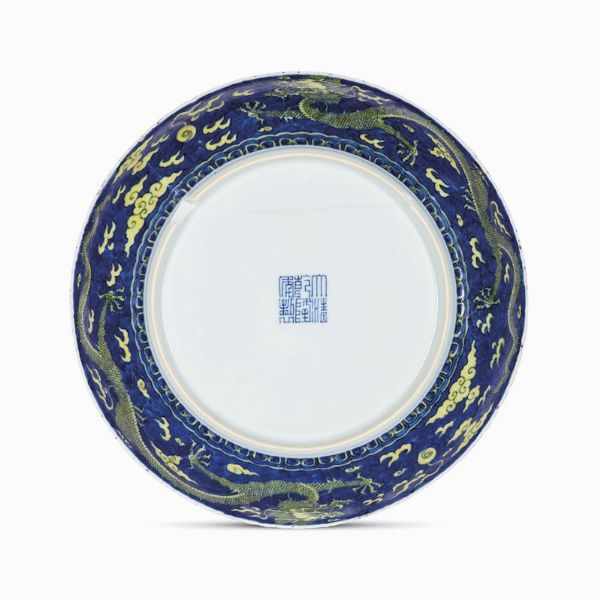

SHARE
49
PIATTO, CINA, DINASTIA QING, MARCHIO DEL SIGILLO QIANLONG E DELL’EPOCA
PIATTO, CINA, DINASTIA QING, MARCHIO DEL SIGILLO QIANLONG E DELL’EPOCA
in porcellana blu dipinto con draghi feroci in giallo che si contorcono inseguendo perle fiammeggianti tra le nuvole su uno sfondo blu cobalto, accentuato con smalto giallo antimonio soprasmalto. Il rovescio presenta altri due draghi inseguiti da perle fiammeggianti. La parte inferiore decorata con i motivi di petali di fiore di loto. I draghi dotati di cinque artigli e hanno l'aspetto "dalla faccia da demone"
Diam. cm 25
清乾隆 青花黄彩团龙戏珠图盘 大清乾隆年制六字三行篆书底款 直径25厘米
此盘为青花黄彩团龙戏珠图,盘心绘制龙戏珠,周围点缀如意流云。内外壁各饰两条游龙戏珠,足边绘仰莲纹。整器成型规整,青花为地,黄彩点缀,胎釉精良,更显黄彩的鲜艳。江西省博物馆亦珍藏有相类似的官窑器。
此器的纹样及构图与乾隆时期其他龙纹瓷器相似,独特之处在于未以黄釉为地,而是将其用作装饰色彩,用以描绘龙、云等图案。青花黄彩器需进行二次烧制,首先烧成蓝地白花,随后在白釉处填入黄彩,再次入炉烘烤而成。据《国朝宫史》卷十七所载,这类蓝地黄彩龙纹碗、盘一般供皇宫内的“嫔”使用。
A DRAGON PLATE, CHINA, QING DYNASTY, MARK OF THE QIANLONG SEAL AND PERIOD
This plate features a Blue and Yellow Dragon Playing with Pearl design from the Qianlong period of the Qing Dynasty, with a six-character inscription in seal script on the base, indicating its production during the reign of Emperor Qianlong. It has a diameter of 25 centimeters.
The central motif of the plate depicts a dragon playing with a pearl, surrounded by auspicious and stylized clouds. Both the inner and outer walls are adorned with two dragons playing with pearls, while the foot is decorated with an upright lotus pattern. The overall structure of the vessel is well-proportioned, with blue and white as the primary colors, accented by vibrant yellow hues. The fine glaze further enhances the brilliance of the yellow color. Similar official kiln wares with comparable characteristics are also preserved in the Jiangxi Provincial Museum.
The patterns and composition of this artifact resemble other dragon-themed porcelain from the Qianlong period. What sets it apart is the unique use of yellow glaze as a decorative element rather than as the base color, depicting intricate designs of dragons and clouds. The production of blue and yellow porcelain involves a two-stage firing process, initially firing the blue ground with white floral patterns and subsequently adding yellow color in the white glazed areas, followed by a second firing in the kiln. According to Volume 17 of the "History of the Palace of the Great Qing Dynasty," such blue and yellow dragon-patterned bowls and plates were typically used by concubines within the imperial palace.
in porcellana blu dipinto con draghi feroci in giallo che si contorcono inseguendo perle fiammeggianti tra le nuvole su uno sfondo blu cobalto, accentuato con smalto giallo antimonio soprasmalto. Il rovescio presenta altri due draghi inseguiti da perle fiammeggianti. La parte inferiore decorata con i motivi di petali di fiore di loto. I draghi dotati di cinque artigli e hanno l'aspetto "dalla faccia da demone"
Diam. cm 25
清乾隆 青花黄彩团龙戏珠图盘 大清乾隆年制六字三行篆书底款 直径25厘米
此盘为青花黄彩团龙戏珠图,盘心绘制龙戏珠,周围点缀如意流云。内外壁各饰两条游龙戏珠,足边绘仰莲纹。整器成型规整,青花为地,黄彩点缀,胎釉精良,更显黄彩的鲜艳。江西省博物馆亦珍藏有相类似的官窑器。
此器的纹样及构图与乾隆时期其他龙纹瓷器相似,独特之处在于未以黄釉为地,而是将其用作装饰色彩,用以描绘龙、云等图案。青花黄彩器需进行二次烧制,首先烧成蓝地白花,随后在白釉处填入黄彩,再次入炉烘烤而成。据《国朝宫史》卷十七所载,这类蓝地黄彩龙纹碗、盘一般供皇宫内的“嫔”使用。
A DRAGON PLATE, CHINA, QING DYNASTY, MARK OF THE QIANLONG SEAL AND PERIOD
This plate features a Blue and Yellow Dragon Playing with Pearl design from the Qianlong period of the Qing Dynasty, with a six-character inscription in seal script on the base, indicating its production during the reign of Emperor Qianlong. It has a diameter of 25 centimeters.
The central motif of the plate depicts a dragon playing with a pearl, surrounded by auspicious and stylized clouds. Both the inner and outer walls are adorned with two dragons playing with pearls, while the foot is decorated with an upright lotus pattern. The overall structure of the vessel is well-proportioned, with blue and white as the primary colors, accented by vibrant yellow hues. The fine glaze further enhances the brilliance of the yellow color. Similar official kiln wares with comparable characteristics are also preserved in the Jiangxi Provincial Museum.
The patterns and composition of this artifact resemble other dragon-themed porcelain from the Qianlong period. What sets it apart is the unique use of yellow glaze as a decorative element rather than as the base color, depicting intricate designs of dragons and clouds. The production of blue and yellow porcelain involves a two-stage firing process, initially firing the blue ground with white floral patterns and subsequently adding yellow color in the white glazed areas, followed by a second firing in the kiln. According to Volume 17 of the "History of the Palace of the Great Qing Dynasty," such blue and yellow dragon-patterned bowls and plates were typically used by concubines within the imperial palace.
Arte Orientale
mar 19 DICEMBRE 2023 - ven 19 GENNAIO 2024






